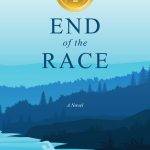END OF THE RACE was triggered by a news story of a missing man, thus was a contemporary mystery at birth. Why? Dead? Not? Intentional? Not? How does one come to this? What sort of man would choose to vanish?
But once triggered, every story takes it shape from the mysterious convergence of many strands, conscious and unconscious, so it is always a source of amazement, to me, that the result is a coherent whole. I love that surprise; it comes without any real need to explain itself. Over the years, I recognize, by hindsight, the conflicts and issues that have shaped my life transformed into story without intention. This magical release fascinates me and satisfies my need to understand why people do what they do.
Who was he? Where did he come from? I find my characters arise most often from place, and usually a place I know from inside out. I chose the shores of Traverse Bay because, as I said in my first blog, it’s a place I have many memories. Fontenac is the fictional amalgamation of many towns, but the Wolfson family land, created by the Homestead Act—with its water tower, old buildings, orchard—was a resort we went to for many years. It carries the quietude of age, endurance, and perseverance that felt right.
Forefront in my memories is swimming in the sand-bottom lake or Traverse Bay. Chicago-bred, Lake Michigan is in my genes, as is swimming. So a woman emerges, swimming.
“Annika swam into open water, each stroke breaking the early morning silence, scattering the reflection of the surrounding forest. She turned on her back to watch her wake settle, and the wavy image of the woods returned to surround her.”
She isn’t me, though I’m a swimmer. Annika is escaping from the bells and whistles of competitive swimming, and Olympic training emerged as a complete surprise. It is one of the rewarding things about creative writing, for me at least that, though it begins from some inner force, it carries you beyond your own life experience, walks you in other people’s shoes. Too many would-be writers are told, “Write what you know,” so obediently stay within their own life experience. Such expansion takes research, but expand our life experience and create compassion and understanding when they carry us into other lives and places. Because Olympic training has been central to Annika’s life, she sprang free of the inner drive that created her.
Six-year-old Sadie bounced into the story on her own, but I’m delighted to find her there. Yes, her voice arises from the memory of two small daughters, but she is totally herself as well as a critical part of Annika’s decisions. Too often, today, writers feel they have to create “independent” women, free of all bonds—even if without bonds their protagonists become rootless and even lost. The roots of character lie in those bonds.
So what of Brian, her husband and coach?
“Why’d he go without us?”
Why indeed? “Because …” She searched for an answer that would satisfy a six-year-old. “Some old friends asked him to go on a sail trip—friends he met in college.” She kept her voice light, hiding her bewilderment. Nothing had been right since the baby’s loss. His words of comfort had been a tight-wound imitation of himself. And over and over he’d gone off, then he’d come back apologizing, muttering that when they got back to training they’d be okay. Then he goes off for two weeks. Just like that?
Pieces of his character and of their life emerge from Annika’s memory, but we must build him second-hand, through Annika. One of the oddities about this book is that I wrote and finished a draft without meeting him myself—and ended up unsatisfied. Very. Only when a member of my critique group complained that not only was Brian missing, he was a missing dimension, did I realize a major rewrite was in order—a striking example of the importance of critique groups. I knew immediately that Brian had to emerge in his own voice. There is nothing in Brian’s story that relates to my own life, but I recognize him—as though he speaks to another inner part of myself. I feel no need to identify or analyze this, for this is why we relate to characters in stories we read, and that identification carries us onward.
Once I brought Brian to life, the other characters and the situations they came out of gained depth also—the subject of another blog.


Your prose is beautiful. I’ve always admired it and was inspired by it.
Thank you, Joe. The admiration is mutual.
I like where this is going, Judy. Looking forward to more discussion
Hope it won’t disappoint you.